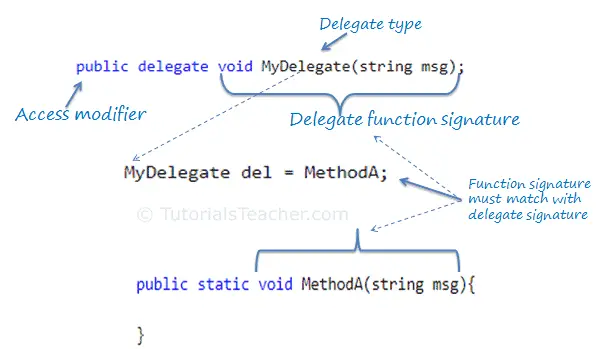C# Delegates
The delegate is a reference type data type that defines the method signature. You can define variables of delegate, just like other data type, that can refer to any method with the same signature as the delegate.
There are three steps involved while working with delegates:
- Declare a delegate
- Create an instance and reference a method
- Invoke a delegate
A delegate can be declared using the delegate keyword followed by a function signature, as shown below.
[access modifier] delegate [return type] [delegate name]([parameters])
The following declares a delegate named MyDelegate.
public delegate void MyDelegate(string msg);
Above, we have declared a delegate MyDelegate with a
After declaring a delegate, we need to set the target method or a lambda expression. We can do it by creating an object of the delegate using the new keyword and passing a method whose signature matches the delegate signature.
public delegate void MyDelegate(string msg); // declare a delegate
// set target method
MyDelegate del = new MyDelegate(MethodA);
// or
MyDelegate del = MethodA;
// or set lambda expression
MyDelegate del = (string msg) => Console.WriteLine(msg);
// target method
static void MethodA(string message)
{
Console.WriteLine(message);
}
You can set the target method by assigning a method directly without creating an object of delegate e.g., MyDelegate del = MethodA.
After setting a target method, a delegate can be invoked using the Invoke() method or using the () operator.
del.Invoke("Hello World!");
// or
del("Hello World!");The following is a full example of a delegate.
public delegate void MyDelegate(string msg); //declaring a delegate
class Program
{
static void Main(string[] args)
{
MyDelegate del = ClassA.MethodA;
del("Hello World");
del = ClassB.MethodB;
del("Hello World");
del = (string msg) => Console.WriteLine("Called lambda expression: " + msg);
del("Hello World");
}
}
class ClassA
{
static void MethodA(string message)
{
Console.WriteLine("Called ClassA.MethodA() with parameter: " + message);
}
}
class ClassB
{
static void MethodB(string message)
{
Console.WriteLine("Called ClassB.MethodB() with parameter: " + message);
}
}
The following image illustrates the delegate.

Passing Delegate as a Parameter
A method can have a parameter of the delegate type, as shown below.
public delegate void MyDelegate(string msg); //declaring a delegate
class Program
{
static void Main(string[] args)
{
MyDelegate del = ClassA.MethodA;
InvokeDelegate(del);
del = ClassB.MethodB;
InvokeDelegate(del);
del = (string msg) => Console.WriteLine("Called lambda expression: " + msg);
InvokeDelegate(del);
}
static void InvokeDelegate(MyDelegate del) // MyDelegate type parameter
{
del("Hello World");
}
}
class ClassA
{
static void MethodA(string message)
{
Console.WriteLine("Called ClassA.MethodA() with parameter: " + message);
}
}
class ClassB
{
static void MethodB(string message)
{
Console.WriteLine("Called ClassB.MethodB() with parameter: " + message);
}
}
Multicast Delegate
The delegate can point to multiple methods. A delegate that points multiple methods is called a multicast delegate. The "+" or "+=" operator adds a function to the invocation list, and the "-" and "-=" operator removes it.
public delegate void MyDelegate(string msg); //declaring a delegate
class Program
{
static void Main(string[] args)
{
MyDelegate del1 = ClassA.MethodA;
MyDelegate del2 = ClassB.MethodB;
MyDelegate del = del1 + del2; // combines del1 + del2
del("Hello World");
MyDelegate del3 = (string msg) => Console.WriteLine("Called lambda expression: " + msg);
del += del3; // combines del1 + del2 + del3
del("Hello World");
del = del - del2; // removes del2
del("Hello World");
del -= del1 // removes del1
del("Hello World");
}
}
class ClassA
{
static void MethodA(string message)
{
Console.WriteLine("Called ClassA.MethodA() with parameter: " + message);
}
}
class ClassB
{
static void MethodB(string message)
{
Console.WriteLine("Called ClassB.MethodB() with parameter: " + message);
}
}
The addition and subtraction operators always work as part of the assignment: del1 += del2; is exactly equivalent to del1 = del1+del2; and likewise for subtraction.
If a delegate returns a value, then the last assigned target method's value will be return when a multicast delegate called.
public delegate int MyDelegate(); //declaring a delegate
class Program
{
static void Main(string[] args)
{
MyDelegate del1 = ClassA.MethodA;
MyDelegate del2 = ClassB.MethodB;
MyDelegate del = del1 + del2;
Console.WriteLine(del());// returns 200
}
}
class ClassA
{
static int MethodA()
{
return 100;
}
}
class ClassB
{
static int MethodB()
{
return 200;
}
}
Generic Delegate
A generic delegate can be defined the same way as a delegate but using generic type parameters or return type. The generic type must be specified when you set a target method.
For example, consider the following generic delegate that is used for int and string parameters.
public delegate T add<T>(T param1, T param2); // generic delegate
class Program
{
static void Main(string[] args)
{
add<int> sum = Sum;
Console.WriteLine(sum(10, 20));
add<string> con = Concat;
Console.WriteLine(conct("Hello ","World!!"));
}
public static int Sum(int val1, int val2)
{
return val1 + val2;
}
public static string Concat(string str1, string str2)
{
return str1 + str2;
}
}
1. Func Delegates: Tutorial Link
2. Action Delegates: Tutorial Link
3. Predicate Delegates: Tutorial Link
Delegate is also used to declare an Event and an Anonymous Method.
 Points to Remember :
Points to Remember :- Delegate is the reference type data type that defines the signature.
- Delegate type variable can refer to any method with the same signature as the delegate.
- Syntax: [access modifier] delegate [return type] [delegate name]([parameters])
- A target method's signature must match with delegate signature.
- Delegates can be invoke like a normal function or Invoke() method.
- Multiple methods can be assigned to the delegate using "+" or "+=" operator and removed using "-" or "-=" operator. It is called multicast delegate.
- If a multicast delegate returns a value then it returns the value from the last assigned target method.
- Delegate is used to declare an event and anonymous methods in C#.
Comments
Post a Comment